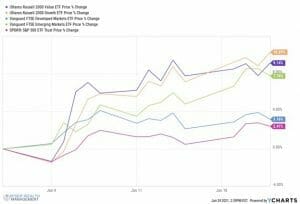
January Effect and Your Portfolio
What is the January Effect? You may have heard it on television or read articles mentioning it. The January Effect is the perceived seasonal increase in stock prices in January especially during the first few weeks of the month. It is also stated that January predicts how the markets will perform for the rest of the year. It has been interesting to see the record jumps so far this January despite the uncertainties due to increases in COVID infections and deaths, Georgia Senate Runoff, Insurrection, and an incoming new President. Currently, as of 1/23/21, the markets are being led by the small caps and emerging markets but tech and other S&P500 are still in the green.
Analysts attribute the increase in January to the increased buying at the beginning of the year due to the fact that investors sell off stocks for last minute tax loss harvesting in December. Others say it could be due to the fact that clients may make resolutions to have better financial habits. Just like resolutions to join the gym and/or eat healthier, they might also want to make smarter money decisions in the coming year with their company bonus, raise, etc. Another theory is that mutual fund managers go shopping at the end of December to purchase stocks that have appreciated significantly during the year known as “window dressing.”
Regardless of these theories, Investopedia reports that from 1928 through 2018, the S&P 500 rose 62% of the time in January (56 times out of 91). However, other sources such as Burton Malkiel, the author of “A Random Walk Down Wall Street,” criticize the January Effect, stating that “seasonal anomalies such as it doesn’t provide investors with any reliable opportunities.” It is worth noting that most moves in market are usually due to institutional trading less on the smaller retail accounts. Although, if you have been watching the news recently with GameStop, this could be changing. A majority of assets are now held in retirement accounts where there is more focus on the amount invested, rather that tactical moves to increase account performance.
In recent years, it appears that although the numbers might align, the January Effect is less of a rule and not particularly relevant. There are various terms in the industry covering these different seasonal changes including “Halloween effect,” “Sell in May and go away” and “Santa Claus Rally.” While some seasonal changes in the market may occur, they don’t always follow predictable patterns and should not affect the way you invest. As we have discussed in other posts, it is important to not attempt to time the market, but realize that markets are cyclical and trying to get in and out of the market may cause you to miss out on some of the best days. Instead, it is important to focus on the dollar cost averages in accounts that are diversified across long-term healthy asset classes.
Matthews Barnett, CFP®, ChFC®, CLU®
Financial Planning Specialist
Share This Story, Choose Your Platform!
Wiser Wealth Management, Inc (“Wiser Wealth”) is a registered investment adviser with the U.S. Securities and Exchange Commission (SEC). As a registered investment adviser, Wiser Wealth and its employees are subject to various rules, filings, and requirements. You can visit the SEC’s website here to obtain further information on our firm or investment adviser’s registration.
Wiser Wealth’s website provides general information regarding our business along with access to additional investment related information, various financial calculators, and external / third party links. Material presented on this website is believed to be from reliable sources and is meant for informational purposes only. Wiser Wealth does not endorse or accept responsibility for the content of any third-party website and is not affiliated with any third-party website or social media page. Wiser Wealth does not expressly or implicitly adopt or endorse any of the expressions, opinions or content posted by third party websites or on social media pages. While Wiser Wealth uses reasonable efforts to obtain information from sources it believes to be reliable, we make no representation that the information or opinions contained in our publications are accurate, reliable, or complete.
To the extent that you utilize any financial calculators or links in our website, you acknowledge and understand that the information provided to you should not be construed as personal investment advice from Wiser Wealth or any of its investment professionals. Advice provided by Wiser Wealth is given only within the context of our contractual agreement with the client. Wiser Wealth does not offer legal, accounting or tax advice. Consult your own attorney, accountant, and other professionals for these services.






